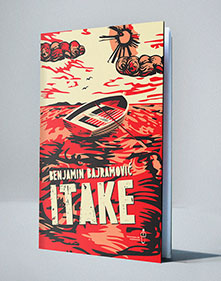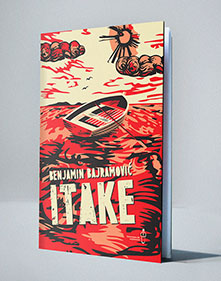
Itake is a novel written in a superbly poetic style, proof that Benjamin Bajramović is among the most talented writers of his generation in the South Slavic literary sphere. Over the past four years, as a member of the jury for the Mirko Kovač Prize, I have closely followed the novelistic output of young writers in this linguistic area, and I have not come across a work that demonstrates such abundant narrative and poetic talent as Bajramović’s Itake. Books of this kind are true literary events in the milieu from which they emerge, because beyond their undeniable value they suggest that the author, in his development, may decisively shape the literary landscape with his future works.
Bajramović’s exceptional gift is fully expressed on two levels of narrative structure: in composition, where four stories are woven into a whole not through direct narrative links but through the same events told from different perspectives; and in narration, where elements of poetry and drama are drawn into the prose. One could say that poetry permeates this novel to the fullest extent: poetry in the crafting of images within sentences, in the building of atmosphere, and in the emotional trajectory of the story. Such a narrative strategy demands the utmost of a writer—the ability to construct sentences in which poetic devices (imagery, metaphor, symbol, metonymy) carry the storyline itself, so that in the fusion of poetry and prose the highest aesthetic effects are achieved. At the same time, elements of drama enter the novel, to the point that it could also be described as a “narrative drama.”
Itake unfolds on a distinctive dramatic stage: Delboj’s shabby basement tavern, where the characters gather daily, bound by friendship and pressed into existential crisis by their generation’s drama within a society in transition. Poetization, visualization, chromatic detail, and dramatization of the narrative result in a superb style, while the inner—above all psychological, but also ethical—tension of the story creates such intensity that Itake is not so much read as devoured. The reader cannot remain outside the novel but is drawn into its space, overwhelmed by its ethical dilemmas, participating with the characters, becoming one of them—or, in its cathartic effect, becoming all of them together. Reading becomes a kind of co-existence with the characters’ existential situations, until one realizes that the act of reading has become indistinguishable from being transferred from the reader’s reality into that of the characters. Such an effect is achieved only by the very best works and by writers of rare talent.
Organized into four distinct stories set in the same narrative space and revolving around the same events, Itake is the first true generational novel in Bosnian literature. It captures our time within the ethical dramas of its protagonists and, within that, the predicament of young people facing utter social despair. Maša, Nećko, Delboj, and Jakov are figures we encounter every day in the young who cannot stay here, trapped in the hopelessness of a transitional country where all social values have been destroyed. Yet their departures abroad, in search of secure existence in more stable societies, call for profound—above all ethical—self-examination. Itake is therefore a novel about generational fate in today’s Bosnia and Herzegovina, but also in all peripheral countries; a novel about a world of economic migration, and equally a novel about love, friendship, and generational conflict, in which the older generation knows it has betrayed every expectation of the young, while the young cannot resolve the social conflict because it is as insoluble as it is hopeless. In this existential dead end, the novel’s characters yearn for their own Ithacas—places of salvation and meaning—even as each recognizes that such places may not exist. Yet despite this recognition, they do not relinquish the hope that somewhere, someday, they might still find their utopia.
The four stories, told from four different perspectives, function as unique narrative mirrors. Each reflects the other three, testing their ethical, psychological, and existential truth, while also standing as an autonomous whole. The first three stories are confessional; the fourth belongs to an unnamed, somewhat indeterminate narrator, a witness to the events recounted. Maša’s story opens into Nećko’s, which opens into Delboj’s, so that we see the same spaces, events, and problems refracted through three distinct voices, each telling not just fragments but the fullness of a life—inner conflicts and conflicts with society. These are autobiographical confessional stories, each almost a novel in itself, yet together they form parts of the broader narrative drama.
As a skilled and talented writer, Bajramović builds metonymic figures into his protagonists, so that Maša, Nećko, and Delboj reflect the condition of their generation. By the same logic, Jakov—around whom the ethical conflict and the love story with Maša revolve—joins them as a sociological-metonymic figure. Thus the novel becomes a narrative drama in which four stories function as social figures probing the present moment, and in their ethical and emotional conflicts reveal psychological depth. One is reminded of the films of Mike Leigh’s social dramas, except that Bajramović’s talent is not only narrative, poetic, and dramatic but also cinematic, as readers perceive the complex relations among the characters. The fourth story follows Jakov’s perspective, but unlike the earlier three, it is not confessional: here the narrator is a witness rather than a protagonist.
Without attempting a full interpretation—the limits of a review do not allow it—I will underline that Itake ultimately develops into a kind of drama of the absurd, in which social evil penetrates from without into the protagonists, yet does not defeat them, even as it corrodes them. In this light, Itake reveals itself as a novel about transitional life as a process of destruction and existential defeat, yet counterbalanced by the ethical principle that constantly asserts itself in the story: a novel of resistance to destruction through energies of empathy, love, and friendship. In a word, Itake is a carefully structured, perfectly narrated, multi-layered novel, written with masterful poetic sentences and psychological depth, by a writer of great talent and literary education.

